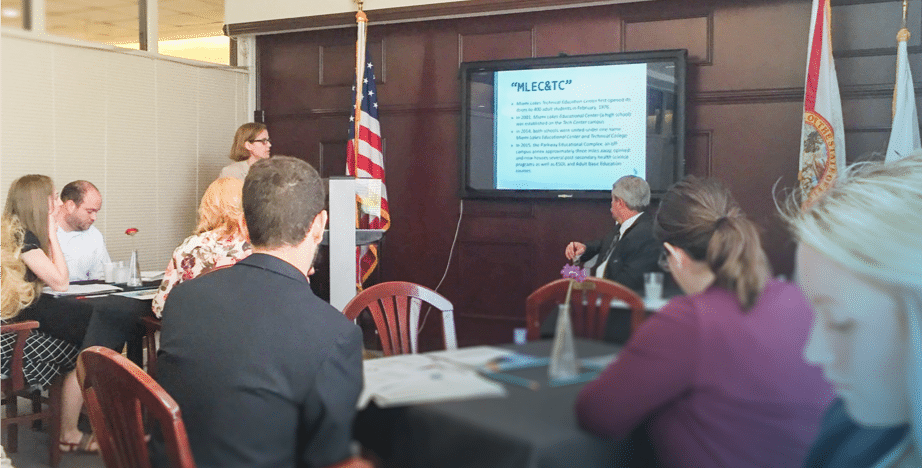Overview
The recently signed Every Student Succeeds Act (ESSA) provides states with greater flexibility to design accountability systems that use multiple measures beyond test scores. Educators and policymakers are increasingly realizing that a more nuanced approach to accountability is necessary if education systems are to prepare students with the knowledge and skills they need to be successful in college, careers, and life.
This forum highlighted approaches to thinking more broadly about accountability, moving away from a focus on assessments and considering recommendations from a recent Stanford Center for Opportunity Policy in Education (SCOPE) report. This report encourages a new paradigm of accountability with a focus on “meaningful learning enabled by professionally skilled educators, supported by adequate and appropriate resources.” As states undertake the development of new accountability systems, this forum explored how research and leading practice can inform our efforts.
Linda Darling-Hammond, President and CEO of the Learning Policy Institute and lead author of the SCOPE report, provided an overview of the report and set the context for the remainder of the forum series. Paul Leather, Deputy Commissioner of Education at the New Hampshire Department of Education, then highlighted that state’s receipt of an accountability waiver under No Child Left Behind (NCLB) and how they are implementing a new competency-based system that combines state and local performance assessments to supplement state tests.
Presenter Biographies
 Linda Darling-Hammond is the President & CEO of the Learning Policy Institute and the Charles E. Ducommun Professor of Education Emeritus at Stanford University. She founded the Stanford Center for Opportunity Policy in Education and served as the faculty sponsor of the Stanford Teacher Education Program, which she helped to redesign. She continues to teach part-time in the Stanford Graduate School of Education. She previously served as Director of the RAND Corporation’s education program and as the William F. Russell Professor of Education at Columbia University, Teachers College. Darling-Hammond is past president of the American Educational Research Association and recipient of its awards for Distinguished Contributions to Research, Lifetime Achievement, and Research-to-Policy. She is also a member of the American Association of Arts and Sciences and of the National Academy of Education. She is recipient of 14 honorary degrees as well as numerous national and international awards for the quality and impact of her research. These include the coveted Grawemeyer Award, the Brock International Prize, the Pomeroy Award for Outstanding Research, and the Margaret B. Lindsay Award for Distinguished Research in Teacher Education.
Linda Darling-Hammond is the President & CEO of the Learning Policy Institute and the Charles E. Ducommun Professor of Education Emeritus at Stanford University. She founded the Stanford Center for Opportunity Policy in Education and served as the faculty sponsor of the Stanford Teacher Education Program, which she helped to redesign. She continues to teach part-time in the Stanford Graduate School of Education. She previously served as Director of the RAND Corporation’s education program and as the William F. Russell Professor of Education at Columbia University, Teachers College. Darling-Hammond is past president of the American Educational Research Association and recipient of its awards for Distinguished Contributions to Research, Lifetime Achievement, and Research-to-Policy. She is also a member of the American Association of Arts and Sciences and of the National Academy of Education. She is recipient of 14 honorary degrees as well as numerous national and international awards for the quality and impact of her research. These include the coveted Grawemeyer Award, the Brock International Prize, the Pomeroy Award for Outstanding Research, and the Margaret B. Lindsay Award for Distinguished Research in Teacher Education.
Darling-Hammond began her career as a public school teacher and co-founded both a preschool and a public high school. She has consulted widely with federal, state, and local officials and educators on strategies for improving education policies and practices. From 1994–2001, she was Founding Executive Director of the National Commission on Teaching and America’s Future, whose 1996 report What Matters Most: Teaching for America’s Future was named one of the most influential reports affecting U.S. education in that decade. In 2006, Darling-Hammond was named one of the nation’s ten most influential people affecting educational policy. In 2008, she served as the leader of President Barack Obama’s education policy transition team. Among her more than 500 publications are a number of award-winning books, including The Right to Learn, Teaching as the Learning Profession, Preparing Teachers for a Changing World and The Flat World and Education. She received an Ed.D. from Temple University, with highest distinction, and a B.A., magna cum laude, from Yale University.
Follow Linda Darling-Hammond on Twitter at @LDH_ed and the Learning Policy Institute at @LPI_Learning.
 Paul Leather’s background and experience in Education, Counseling, and Administration in New Hampshire spans three decades. He is the Deputy Commissioner of the Department of Education in New Hampshire, and has also served for 18 years as the Director of the Division of Career Technology and Adult Learning for the Department, overseeing statewide initiatives such as High School Redesign, Extended Learning Opportunities, and Drop Out Prevention, as well as the administration of Vocational Rehabilitation, Adult Education, Career and Technical Education, Tech-Prep, and School Guidance and Counseling. In 1997, as part of the NH School to Career efforts, Mr. Leather began the journey to create a state model for a “competency-based student transcript.” This effort resulted in the development and implementation of the NH Competency based Assessment System” and ultimately to the student mastery model now in place as part of NH’s school approval standards. More recently, he has led the development of a first-in-the-nation next generation educational accountability model, called “Performance Assessment of Competency Education,” or PACE, approved as a pilot program with four NH districts in March, 2015.
Paul Leather’s background and experience in Education, Counseling, and Administration in New Hampshire spans three decades. He is the Deputy Commissioner of the Department of Education in New Hampshire, and has also served for 18 years as the Director of the Division of Career Technology and Adult Learning for the Department, overseeing statewide initiatives such as High School Redesign, Extended Learning Opportunities, and Drop Out Prevention, as well as the administration of Vocational Rehabilitation, Adult Education, Career and Technical Education, Tech-Prep, and School Guidance and Counseling. In 1997, as part of the NH School to Career efforts, Mr. Leather began the journey to create a state model for a “competency-based student transcript.” This effort resulted in the development and implementation of the NH Competency based Assessment System” and ultimately to the student mastery model now in place as part of NH’s school approval standards. More recently, he has led the development of a first-in-the-nation next generation educational accountability model, called “Performance Assessment of Competency Education,” or PACE, approved as a pilot program with four NH districts in March, 2015.


